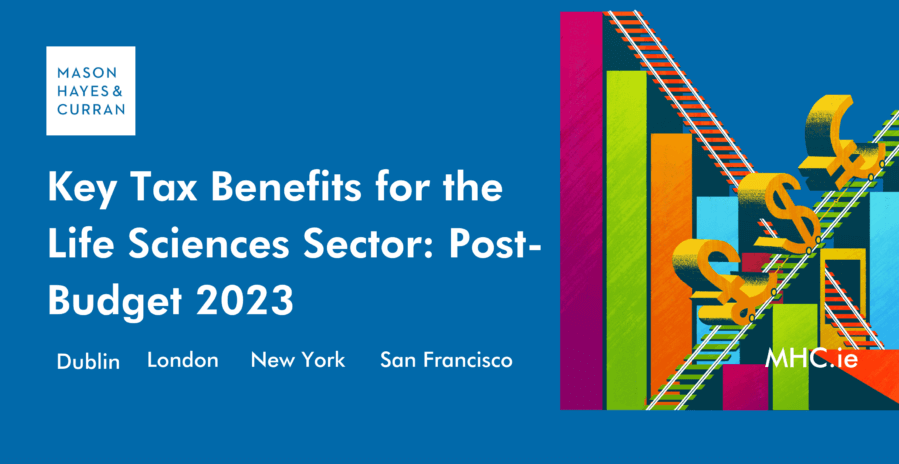
Several announcements made in Budget 2023 are relevant to Digital Health companies operating in Ireland. Our Tax team looks at the relevant announcements and explores the implications of the key tax benefits Ireland offers companies in this sector.
Ireland is a leading jurisdiction of choice for Life Sciences companies looking to establish a European base for global expansion. Businesses with the relevant substance and activities can benefit from:
- A 6.25% knowledge development box (KDB) tax rate on profits from IP developed in Ireland and the EU/EEA
- A 12.5% corporation tax rate on other trading income
- Tax depreciation for intangible assets
- Research and development credit
- Relief for withholding taxes and credit for foreign taxes
- Special tax relief for executives
6.25% IP Box
Ireland has an OECD approved KDB regime which applies to research and development (R&D) operations carried on in Ireland and the EU. Income derived from R&D work leading to the development of IP assets including patented inventions, copyrighted software, and other rights related to medicinal products, and for certain small companies unregistered certified patent rights, is currently taxed a reduced rate of 6.25%. This important relief was due to expire on 31 December 2022. However, it was announced in Budget 2023 that it will be extended for a further four years, up to and including, accounting periods commencing before 1 January 2027.
It was also announced that to prepare for implementation of the OECD Pillar Two agreement, legislation will be introduced to increase the effective rate of the KDB to 10%. This will be brought into effect by ministerial commencement order once agreement is reached by the OECD/G20. The precise ambit of this increase will be clarified shortly in the Finance Bill 2023.
12.5% trading rate
Trading companies in Ireland are subject to corporation tax at 12.5%. This rate will remain unchanged for the vast majority of companies. However, it is expected to increase to 15% for companies with a global turnover more than €750m once agreement has been reached on the implementation of the OECD Pillar Two agreement, which has the aim of introducing a global minimum 15% effective tax rate.
Research and development credit
Ireland offers a generous 25% tax credit for R&D expenditure carried on within Ireland and/or the EU/EEA. Expenditure for these purposes includes expenditure on plant, equipment, and buildings where R&D activities are carried on by the company in that building. Currently, the 25% tax credit can be utilised to reduce tax payable at the corporate level or to incentivise employees in a tax efficient manner. It was announced in Budget 2023 that changes relating to the payment of the R&D credit will be implemented to align with requirements under the OECD Pillar Two rules. However, no changes are being made to the quantum of credit that a company may earn.
Tax depreciation for intangible assets
Tax depreciation available for capital expenditure incurred on acquiring IP remains unchanged. This relief allows companies to invest in new technologies and/or migrate existing IP to Ireland tax efficiently. It may be claimed on a broad range of qualifying intangibles, including:
- Patents
- Trademarks
- Brands
- Know-how
- Trade secrets, and
- Secret processes
Write-offs may be claimed at a rate in line with the accounting treatment or at a rate of 7% for years 1 to 14 and 2% in year 15. The relief for any one year, in aggregate with any interest expense, is capped at 80% of the trading related income and the balance is carried forward against future profits.
Special tax relief for executives
Ireland offers special tax relief known as ‘Special Assignee Relief Program’ (SARP), for executives seconded to work in Ireland for a minimum period of 12 consecutive months. SARP is available for up to 5 years. The relief reduces the amount of income tax payable by qualifying executives by 30% above a set income level. It was announced in Budget 2023 that this relief will be extended until the end of 2025 which is welcome. However the set income level at which the relief will be available is being increased from €75,000 to €100,000.
Conclusion
Overall, Budget 2023 announcements are positive for the Life Sciences sector with the extension of important reliefs for carrying out R&D activities in Ireland and for companies seeking to leverage off their existing talent pool in the short to medium term utilising SARP relief. These measures should facilitate the expansion and establishment of Life Sciences companies in Ireland in the coming years.
For more information, contact a member of our Tax team.
The content of this article is provided for information purposes only and does not constitute legal or other advice.





